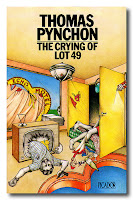Hans and Doug, however, were more positive, Doug announcing that this was perhaps the seventh time he had read it, that he still wasn't entirely sure what it was about, but that he really loved and admired it. It's the story of a young woman, Oedipa Maas, who one afternoon returns to her California home from a Tupperware party to find she has been made the unlikely executor of the will of a past lover, real estate mogul Pierce Inverarity. If indeed story is a word that can be applied to the off-beat and sometimes seemingly disconnected events that follow as she drives south to carry out this duty, becoming involved with ex-child-actor lawyers, a larky pop group recalling the Beatles or the Monkees, and the mystery of a medieval postal system with the sign of a muted horn, still apparently existing in an underground form and somehow implicated in Inverarity's vast and complicated estate. Or is it? Inverarity (note the echoes of verity/truth in the name) has left behind a postage stamp collection which at the end of the book will become an item in an auction (Lot 49), and appears to hold clues to this, but how can Oedipa be sure that it isn't all a huge practical joke on Inverarity's part?
There are comic disconnected dialogues and madcap scenes reminiscent of a certain kind of film popular at the time, the sixties, and characteristic of that era's popular larky view of itself. It's clear that these are intended, paradoxically, to illustrate the serious theme of the book, that of the difficulties of communication and the impossibility of ever knowing the true significance of things in a culture in which the social and moral barriers are breaking down. Unfortunately, however, I think it was this fragmented nature that made the book unmemorable for me, and some in the group found the events silly rather than funny, in particular John, and Mark who was the most critical of all. The serious purpose is evident in the language, the satirical naming and magnificent long, convoluted sentences which Doug in particular admired. He said that if he himself had managed to write something as good as the riff early in the book on the former car-sales career of Oedipa's husband Mucho, then he would die happy:
Yet at least he had believed in the cars. Maybe to excess: how could he not, seeing people poorer than him come in, Negro, Mexican, cracker, parade seven days a week, bringing the most godawful trade-ins: motorized, mechanical extensions of themselves, of their families and what their whole lives must be like, out there for anybody, a stranger like himself, to look at, frame cockeyed, rusty underneath, fender repainted in a shade just off enough to depress the value, if not Mucho himself, inside smelling hopelessly of children, supermarket booze, two, sometimes three generations of cigarette smokers, or only of dust - [This single sentence continues for another half-page.]Everyone agreed that the passage was extremely well written, but some pointed out that its subject was never picked up on again, was just left dangling and seemed to be there just for its own clever sake - which may have been the thematic point, but was unsatisfying. There are other sentences that are less easy to read and people expressed irritation at having constantly to go back and read them over and over again, and that on the whole they had lacked the necessary patience - and I have to say that I found, particularly in the latter half of the book, that some of the sentences overreached themselves and resulted in clumsiness. (There is in fact a certain imprecision in the middle of the sentence quoted above, although, as John has said to me, that is perhaps acceptable for the laid-back, 'psychedelic' literary style of the time.)
Which is all that I can remember was said before we dropped the subject of the book, left it dangling, and larkily went off to our Christmas dinner in Aladdin's over the road.
Our archive discussions can be found here and a list of the books we have discussed, with links to the discussions, here










